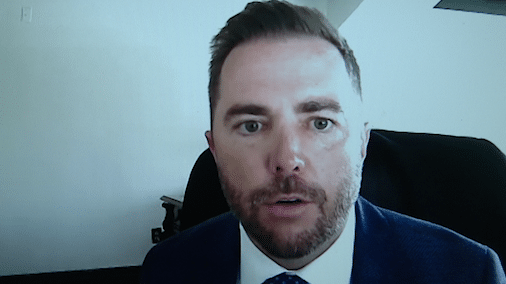Jane McGarry (00:00):
January is usually reserved for kicking bad habits and keeping resolutions. Did you also know though that it is known as divorce month? Attorney Justin Sisemore is the winner of multiple awards, including Super Lawyers, The 400 Most Influential People, Top Divorce Attorney year after year, and the owner of Sisemore Law Firm in Fort Worth. And he’s here with some advice to get you through the four key steps in the divorce process. Very big deal when you’re getting a divorce. Thanks for coming in.
Justin Sisemore (00:29):
Thank you.
Jane McGarry (00:29):
Why is January referred to as divorce month?
Justin Sisemore (00:32):
Well, we’ve talked about it on several different segments, but basically this is a time for change physically, emotionally, and spiritually. And oftentimes at this time it’s time for reflection, where you see people not rowing in the same direction-
Jane McGarry (00:44):
Right.
Justin Sisemore (00:45):
… and not being on the same path as you.
Jane McGarry (00:46):
Right.
Justin Sisemore (00:46):
And so unfortunately, in the situation of the divorce segment, that becomes a time for change.
Jane McGarry (00:52):
So what are the four key phases of the divorce process?
Justin Sisemore (00:56):
So every divorce starts out with some form of agreement or temporary orders. Then you have discovery, you move on to mediation and a final trial.
Jane McGarry (01:04):
And what happens during the temporary order space?
Justin Sisemore (01:07):
The temporary orders is either done by agreement, so you’ll reach an agreement either outside of court or inside of court.
Jane McGarry (01:12):
Mm-hmm (affirmative).
Justin Sisemore (01:12):
If it’s inside of court, you’re dealing with issues of visitation and access of the children, management of the financial accounts, who controls the business, who has the house use and enjoyment of the property while the case is pending. And it’s a very important timeframe to make sure you get it right in the beginning, because oftentimes when you lead into mediation it really sets the tone and pace for the case.
Jane McGarry (01:34):
And discovery, what happens?
Justin Sisemore (01:35):
Discovery is where you get all your documents together. It’s the not fun part of the divorce process, if there is a fun part. But that’s the not fun part, but it’s basically where you gather all your evidence, get it ready for court. And if you don’t provide it to the other side in the state of Texas, you’re not allowed to use it. So, good lawyers will object if they have good discovery logs and keep you from getting vital information to the other side and out to the court.
Jane McGarry (01:56):
During mediation?
Justin Sisemore (01:59):
Mediation is the process where one party sits in one room, the other party sits in another room. A mediator goes back and forth and it’s the real chance for the client to control the outcome of the case without leaving it up to an arbiter, a fact or the judge. And in this situation, basically the mediation is completely binding. So you can’t wake up in the morning with buyers remorse-
Jane McGarry (02:16):
Right.
Justin Sisemore (02:16):
… and it’s a chance to really control the outcome of your case.
Jane McGarry (02:19):
And then finally, during the trial phase?
Justin Sisemore (02:21):
Trial phase is really what I call separates the really good lawyers from the ones that aren’t so good because it is where you have to gather all this information, get it in a presentable form and deliver it in a format that’s understandable in a short segment where the judge can really understand where you’re going or the jury can understand where you’re going.
Jane McGarry (02:38):
So a lot of people have sort of a do it yourself. Attitude. Don’t think you need a lawyer to handle a divorce. You advise against that.
Justin Sisemore (02:46):
Well, certainly if you have no assets or no children, there’s plenty of forms out there online. My concern has been and will always be, you have to have a lot of ancillary and closing documents that go along with the divorce decree itself. And so we see a lot of people leave that out or leave out assets or award assets that they didn’t even know they were awarding-
Jane McGarry (03:04):
Right.
Justin Sisemore (03:04):
… and you can’t come back later on and fix it.
Jane McGarry (03:07):
Right.
Justin Sisemore (03:07):
With kid issues, you don’t think about things like geographic restriction, who’s going to have the educational and medical decisions for the children. And so, you don’t really know what they mean and unless you have somebody to explain that to you, you sign away and you can’t come back right away because courts don’t like to clog up the docket.
Jane McGarry (03:21):
So what steps can people take to ensure the divorce process goes as smoothly as is possible for a divorce to go?
Justin Sisemore (03:27):
I’m very big on the clients being very involved in getting their documents together, getting your exhibits together, your witness list. I’m huge on timelines, making sure that you’re very organized with that process because it cuts down on your cost in the process and also allows the attorney to really do their job effectively by having that information available.
Jane McGarry (03:45):
Some great insights. We have only scratched the surface though. Where can people go to learn more?
Justin Sisemore (03:50):
So you can log onto lawyerdfw.com. We have a lot of blogs. We’ve got a great staff and team that’s helped with that. And also you can call us at 817-336-4444.
Jane McGarry (04:01):
And what do people need to do in order to get a complimentary consultation?
Justin Sisemore (04:04):
Just log on, all of our information is there. You can also again, call us at the 817-336-4444 number or log onto lawyerdfw.com
Jane McGarry (04:13):
Okay. Thank you for coming in. I know it’s a very busy time of year for you.
Justin Sisemore (04:16):
It is. Thank you very much.
Jane McGarry (04:17):
Call 817-336-4444 or go to lawyerdfw.com for more information. Don’t miss your chance to get a complimentary consultation. That’s until January 31st, just mention GMT.








